Advance CTE recently released Moving Career Pathways Forward: Learning From the New Skills for Youth Initiative, with support from JPMorgan Chase and in partnership with Education Strategy Group. The report shares the successes and challenges of six states as they sustained career pathways development after the conclusion of a major philanthropic investment and the coronavirus pandemic. The report also features recommendations from state leaders to move career pathways development forward. In this blog, Senior Research Associate Dr. Laura Maldonado provides highlights of lasting legacies and recommendations from the report.
Overview
While receiving a major grant from a funder to support career pathways development is exciting, it is important to develop sustainable systems and processes while leveraging the funding to continue the work beyond the conclusion of the grant. New Skills for Youth (NSFY) was one of the earliest and most impactful philanthropy investments in career pathways and career readiness in recent history. Launched in 2016, and supported by JPMorgan Chase, NSFY was a $75 million, 5-year initiative to strengthen and expand high-quality career pathways for youth.1 Advance CTE, the Council of Chief State School Officers, and Education Strategy Group served as the national partners in NSFY to transform career readiness education in 10 states across the United States. Ultimately, the grant concluded and states had to determine the transition of resources and supports to provide continuity of services.
As states and communities continue to prioritize career pathways policies and programs, it is useful to review insight from NSFY states around scale and sustainability given what they accomplished and what their systems look like today. Advance CTE’s vision for the future of Career Technical Education (CTE) calls on states to ensure each learner engages in a cohesive, flexible, and responsive career preparation ecosystem.2 Thinking upfront about the management of a grant end date helps keep learners at the forefront of high-quality career pathways.
Background
To help address sustainability concerns, Advance CTE identified state leaders from six NSFY states who were willing to share how they sustained growth and progress of career pathways nearly 4 years after the end of the initiative. Moving Career Pathways Forward: Learning From the New Skills for Youth Initiative helps current leaders build on lessons learned and recommendations from past leaders.
Lasting Legacies From the NSFY States
One feature of the report is the highlight of lasting legacies, or systems and structures started during NSFY that are still in existence today.
Kentucky has improved training and support for CTE teachers, collaborates more with industry partners, and has seen changed attitudes regarding regional approaches.
NSFY enabled the Louisiana Department of Education to pursue cutting-edge entrepreneurial initiatives, such as wraparound supports, virtual work-based learning, and other activities that would have taken a long time to be approved for state funding.
Massachusetts has a comprehensive approach to pathways, a common language, and additional capacity support at the district level.
Cohesiveness of college and career readiness efforts in state programming and a strengthened commitment to equity continues to be a statewide focus in Ohio.
Engaging with employers, using data to address equity gaps, and elevating career education to learners, families and key partners were key efforts sustained in Rhode Island.
And finally, efforts launched in NSFY that have been sustained in Wisconsin include Regional Career Pathways and assessment practices for regional pathway work.
Recommendations From the NSFY States
Another feature of the report is recommendations and action steps to sustain career pathways across multiple partner groups. These recommendations come from the learned experiences of state leaders and provide additional examples from states.
State Agencies and Intermediaries
- Navigate the Team Through the Change Management Process. Turnover is to be expected over a number of years in organizations and educational systems. State leaders can maintain momentum by offering onboarding and offboarding to team members, creating a shared space for documents and materials, tailoring change messaging for each partner group, and building in time for transition planning.
- Build and Sustain Partnerships. Developing and improving high-quality career pathways requires cross-sector collaborations among secondary education, postsecondary education, and workforce systems. State leaders should align high-level leadership to career pathways, add new employer and industry partnerships, and ensure that routines and structures continue on a consistent basis.
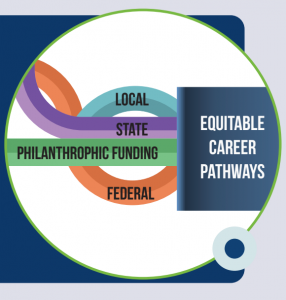 Identify New Funding Streams and Processes. State leaders should continue to leverage existing federal sources (e.g., Carl D. Perkins Career and Technical Education Act [Perkins V] reserve funds), advocate for line items in state budgets, secure private funding and public grants, and better align funding with program approval processes. Finding ways to braid funding streams from federal, state, and local sources can be a strategy to support equitable career pathways.3
Identify New Funding Streams and Processes. State leaders should continue to leverage existing federal sources (e.g., Carl D. Perkins Career and Technical Education Act [Perkins V] reserve funds), advocate for line items in state budgets, secure private funding and public grants, and better align funding with program approval processes. Finding ways to braid funding streams from federal, state, and local sources can be a strategy to support equitable career pathways.3
Local Leaders
- Maintain Engagement With Local Leaders. Although NSFY took a statewide systems-level approach, leaders at the local level were ultimately the linchpin of the day-to-day implementation and execution of the initiative. State leaders should continue to have conversations with districts, CTE leaders, and implementers to ensure that local leaders recognize the long-term process of career pathways systems, and they receive technical assistance to build their capacity.
Learners
- Incorporate Learner Voice Into Career Pathways Processes. State leaders should listen to learners and find ways to incorporate learner voice into career pathways processes by capturing statewide learner data and using existing learner voice resources, such as the Learner Voice Toolkit.4
Advance CTE and Education Strategy Group are currently helping six states and local sites think through the sustainability and scaling of career pathways systems after the conclusion of JPMorgan Chase’s current major career pathways initiative—New Skills ready network.5 The New Skills ready network sites are working to improve learner completion of high-quality career pathways as part of a 5-year initiative, which will end in 2025.
Advance CTE, Education Strategy Group, ExcelinEd, JFF, and New America are also working with 11 states over two cohorts in another initiative focused on scale and sustainability—Launch: Equitable & Accelerated Pathways for All.6 Within Launch, sites are building sustainability plans to address long-standing barriers and achieve scale in their career pathways efforts.
Starting or sustaining statewide initiatives with multiple agencies and partners is a major undertaking. The Moving Career Pathways Forward: Learning From the New Skills for Youth Initiative report helps state leaders use lessons learned from NSFY to replicate promising practices in their state for high-quality career pathways.
Additional Resources
 Please visit Advance CTE’s Learning that Works Resource Center for additional resources about career pathways.
Please visit Advance CTE’s Learning that Works Resource Center for additional resources about career pathways.
- Read more about the states and their progress during the initiative through the New Skills for Youth Snapshots.
- New Skills ready network Annual Reports and Snapshots
Dr. Laura Maldonado, Senior Research Associate


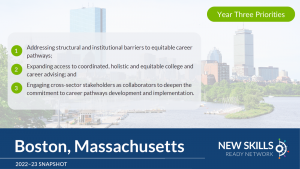
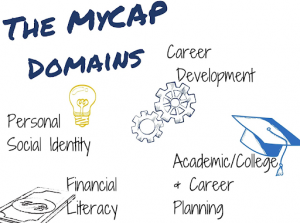 In expanding access to college and career advising, Boston Public School members of the initiative’s
In expanding access to college and career advising, Boston Public School members of the initiative’s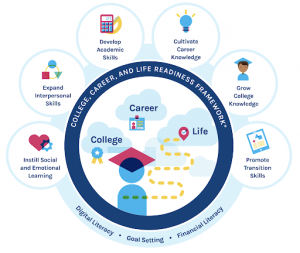 Implementing MyCAP with fidelity across Boston Public Schools requires sustainable and deepened staff capacity at the district’s central office as well as at the school level. Marsha and Erin both support cultivating and maintaining strategic partnerships across the district to align with MyCAP priorities. The collaboration and partnerships during this first year of expanded access to middle-grade learners included leveraging family liaisons who support informing learners and families of opportunities within Boston Public Schools and activating counselor teams that support caseloads of learners in the middle grades. The project team also expanded its reach to include community partnerships that operate in the college and career areas to better serve middle-grade learners. The advantage of bringing these partnerships into the fold allowed greater support for learners with exposure to skills and experiences that support college and career readiness and success (see image).
Implementing MyCAP with fidelity across Boston Public Schools requires sustainable and deepened staff capacity at the district’s central office as well as at the school level. Marsha and Erin both support cultivating and maintaining strategic partnerships across the district to align with MyCAP priorities. The collaboration and partnerships during this first year of expanded access to middle-grade learners included leveraging family liaisons who support informing learners and families of opportunities within Boston Public Schools and activating counselor teams that support caseloads of learners in the middle grades. The project team also expanded its reach to include community partnerships that operate in the college and career areas to better serve middle-grade learners. The advantage of bringing these partnerships into the fold allowed greater support for learners with exposure to skills and experiences that support college and career readiness and success (see image). 
 Over the past six months, four states,
Over the past six months, four states, 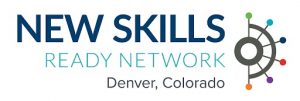 Denver, Colorado’s
Denver, Colorado’s 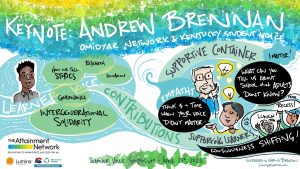
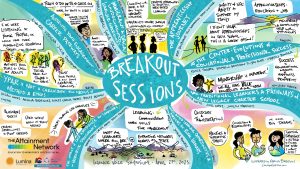
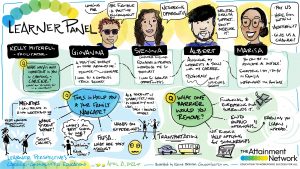
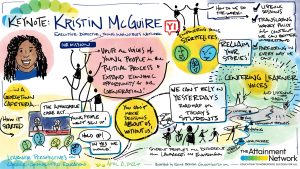
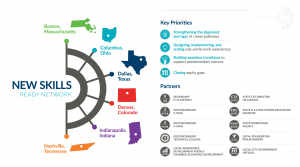
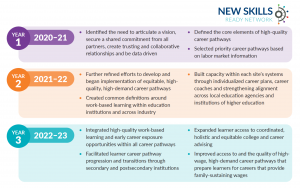
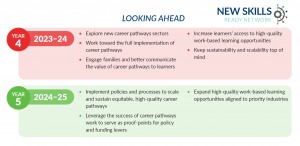
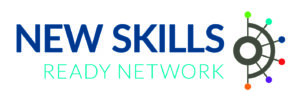 As part of ongoing blog topics providing updates on this initiative, Deshaun Mars, Vice President, Global Philanthropy (Job Skills,) and Brice Thomas, Policy Associate engaged in a discussion to highlight JPMC’s view of the initiative and how this work advances JPMC’s philanthropic portfolio and ultimately building high-quality local and state career pathway systems.
As part of ongoing blog topics providing updates on this initiative, Deshaun Mars, Vice President, Global Philanthropy (Job Skills,) and Brice Thomas, Policy Associate engaged in a discussion to highlight JPMC’s view of the initiative and how this work advances JPMC’s philanthropic portfolio and ultimately building high-quality local and state career pathway systems. 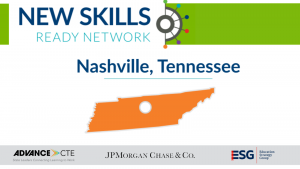 The Nashville, Tennessee site of the
The Nashville, Tennessee site of the 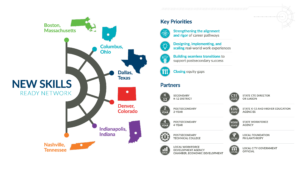

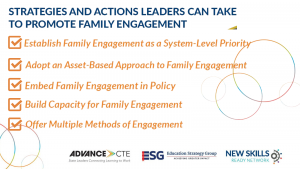
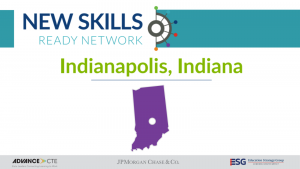 For this post, Senior Policy Associate Dan Hinderliter interviewed Indiana State CTE Director Anthony Harl and Ascend Indiana Vice President and Co-founder Stephanie Bothun about driving intentional connections between state and local partners. In Indiana, the Office of Career and Technical Education (CTE) is embedded in the
For this post, Senior Policy Associate Dan Hinderliter interviewed Indiana State CTE Director Anthony Harl and Ascend Indiana Vice President and Co-founder Stephanie Bothun about driving intentional connections between state and local partners. In Indiana, the Office of Career and Technical Education (CTE) is embedded in the 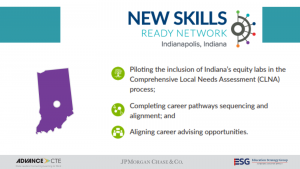 Since this initial partnership developed through the
Since this initial partnership developed through the